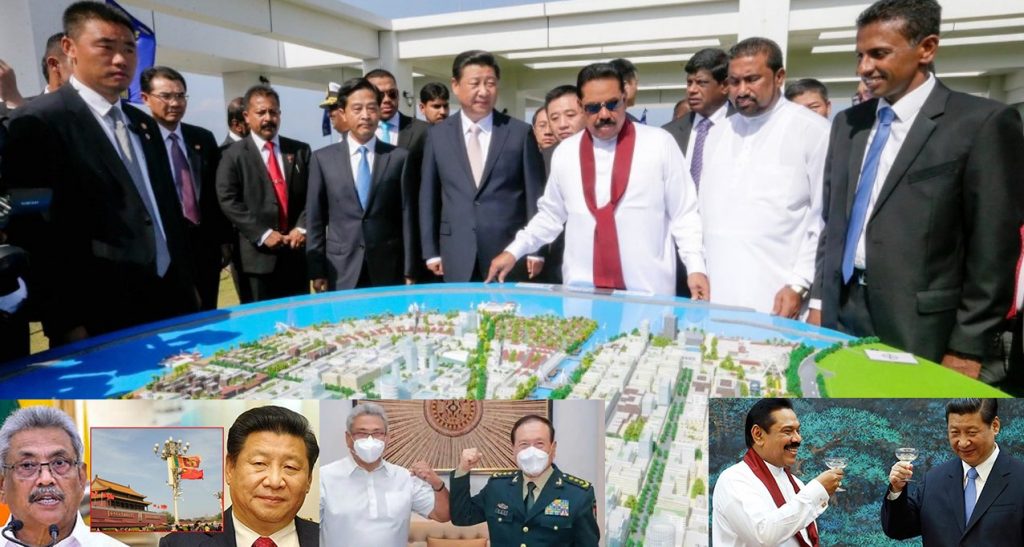Chinese Defence Minister Gen. Wei Fenghe was in Sri Lanka last week seeking to shore up support for Chinese projects at a time when new faultlines have emerged in the island nation on China’s growing footprint. This was the second high profile Chinese visit to Sri Lanka after the one by Yang Jiechi, Director of the Office of the Central Commission for Foreign Affairs of the ruling Communist Party, in October last year. Even during the pandemic, Beijing’s overtures to Sri Lanka have continued unabated with an awareness that perhaps this a unique moment to push Chinese influence as the Rajapaksa clan is in full control. The Chinese embassy in Sri Lanka has taken an unusually high profile role in pushing the cause of the Chinese-built Port City in Colombo.
The Colombo Port City project is important for China as a key node in its Maritime Silk Road in the Indian Ocean and so it is to be expected that Beijing will go all out in ensuring its finalisation. Sri Lanka is touting this $1.4 billion project as the single largest private sector development ever in the island nation in an attempt to justify bending the domestic laws in its favour. And this has generated a massive outcry from various groups in the country who see this as a violation of Sri Lankan sovereignty.
Apart from President Rajapaksa Gotabaya’s ruling party—Sri Lanka Podujana Peramuna—most other political stakeholders, including the Buddhist monks, have opposed this contentious project. Despite this hue and cry, the Colombo Port City Economic Commission Act is now effective with its validation by the Speaker of the Sri Lankan Parliament. It is likely to give China unfettered control over some prime real estate, with the Sri Lankan government’s authority becoming marginal even when issues of movement of people and use of Yuan are concerned.
China’s growing economic footprint in Sri Lanka in recent years is no longer news as more than $8 billion worth of infrastructure projects have been undertaken by Beijing. But the costs have been rising as was reflected most categorically in the case of Hambantota port which despite its unwillingness, Rajapaksa’s successor was forced to hand over to China in 2017 on a 99 years lease. It was Mahinda Rajapaksa who had signed the Hambantota deal with Sri Lanka to begin with and today once again the Colombo Port project is being pushed by the Rajapaksas without any suggestion that past behaviour of China has been taken into account. Today, Chinese influence is so palpable that in place of Tamil, it is Mandarin is being included in the signboards of government projects in contravention of the official trilingual policy in the country wherein Sinhala, Tamil and English are used.
China had used the previous term of the Rajapaksas to its advantage and this time around it’s looking to be the same story. Beijing’s foothold is getting firmer by the day and it is ordinary Sri Lankans that will have to bear the brunt of Rajapaksa largesse eventually. After an initial positive outreach to India, the Rajapaksa’s famous tilt to China is back.
Earlier this year, Sri Lanka cancelled its $500 million agreement with India and Japan to develop the East Container Terminal (ECT) project under the pretext of local opposition. It changed tack and sought investments from the two countries for the West Container Terminal of the Port of Colombo under a public-private partnership model. Where the Rajapaksa government has had no compunction in pushing through a highly unpopular Colombo Port City Project under the Chinese influence, it decided to give India and Japan short shrift.
Amidst rapidly shifting geopolitical trends in the Indo-Pacific, Sri Lanka understands that it will be much sought after and has suggested that it is “observing the rise of Quad as an exclusive military alliance.” This is a sentiment in tune with the Chinese worldview. How this can be reconciled with Sri Lanka’s Foreign Secretary Jayanth Colombage’s remarks that “we will not, we cannot be, we should not be a strategic security concern to India” remains to be seen.
Chinese grip over Sri Lanka is getting tighter and the challenges for India will continue to mount. President Gotabaya has made it clear that Sri Lanka wanted to learn from the Chinese Communist Party’s “governance experience.” This learning has so far entailed ‘white elephant’ infrastructure projects being pursued that had only enriched the Rajapaksas even while severely indebting the nation.
At a time when several nations around the world are reassessing Chinese investments and its model of economic partnership, Sri Lanka under the Rajapaksas has decided to double down on their economic engagement with China. This economic engagement is already having a strategic fallout by enhancing the ability of the Chinese Navy to project power in the waters of the Indian Ocean. India-Sri Lanka ties seem to be entering turbulent waters and the Rajapaksas are making it clear that for all their rhetoric, they are not really interested in balancing between New Delhi and Beijing.
This article was first published by CNBC TV18


